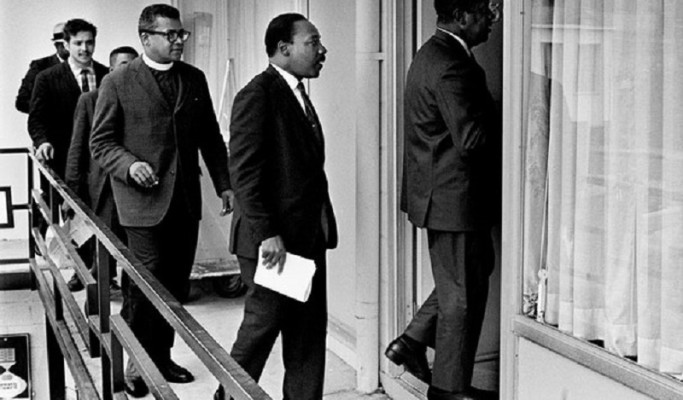The year leading up to the assassination of Dr. Martin Luther King, Jr. is chronicled in a new book entitled Death of a King: The Real Story of Dr. Martin Luther King, Jr. and written by Tavis Smiley with David Ritz.
Smiley, a bestselling author and nationally known broadcaster, leaves “no stone unturned” as he reviews the final year of Dr. King’s life. Smiley delves into the trials and tribulations Dr. King faced, especially the abandonment and isolation he experienced from the White House and the majority of Americans. The Nobel Peace Prize recipient endured tremendous criticism but remained true to his beliefs.
TheVillageCelebration interviewed Smiley about the importance of Dr. King’s last year, whether Black leadership followed up on Dr. King’s initiatives after his death, and the way in which Dr. King challenged the “establishment”. Finally, we asked the man who is becoming known for his criticism of President Barack Obama to rate his work on this latest literary endeavor.
TVC: How important is it for Americans to understand the significance of Dr. King’s last year?
Smiley: Dr. King was human. For people who think they know Dr. King, you really can’t know him…until you understand what he went through during the darkest days of his life. The last year of his life, it turns out, was the most difficult period of his entire existence. He is dead at 39, of that last year, from April 4, 1967 to April 4, 1968 was the most difficult year of his life.
He comes out against the Vietnam War. He starts talking about this ‘triple threat’ of racism, poverty, and militarism. He moved away from just talking about civil rights. Everything and everybody turned on him in the last year of his life. The White House turned on him. The media turned on him…including the Black media. [Sadly], Black folks turned on him. The NAACP turned on him. The Urban League turned on him. It was the darkest period of his life.
The beauty of it is with all that push back, and with all that hatred directed at him, Dr. King kept speaking his truth all the way to the end. And now, almost fifty years later, after his death, King was right on just about everything he said. We have deified him in death. But, we demonized him in life. When I say we deified him, we made him out of a hero and a saint.
TVC: What do you think would have happened if Black leadership had followed through on Dr. King’s initiatives to end poverty, build Black businesses, and moved against the Vietnam War?
Smiley: We might not have seen what we saw in Ferguson. In other words, King was talking about the triple threat…He said if we don’t start to address these issues, the condition of this democracy is in trouble. Today, we are going to lose our democracy…if we don’t get serious about this triple threat: racism, poverty, and militarism. And so, what did we see on display in Ferguson? Racism, poverty, and militarism. Racism, poverty, and militarism are still on display in America, almost 50 years after his death. What might have happened if Black leadership would have followed him, we would have had five decades to work on making progress on those issues.
TVC: Do you think Dr. King, in his last year, challenged the “establishment” which led to his death?
Smiley: Oh, absolutely! At one point, Dr. King was listed by J. Edgar Hoover and the FBI as the most dangerous man in America. The only weapon that Dr. King ever used was love. For one, obviously, he got their attention. Two, they were afraid of him. Three, love is the most powerful force in the world. When you love people, you can be dangerous. Dr. King said that love is the only thing capable of turning an enemy into a friend. And, that’s why they killed him.
TVC: Do you think this is your best work…your best book?
Smiley: This is book number 17. It is without question, I think it is the best book I have ever done. It’s basically my love letter to Dr. King. He is the greatest American that this country has ever produced. He has been my hero ever since the age of 12. I am about to turn 50 later this month. I want to give a gift on my 50th birthday to a man who redirected my life at age 12. He really helped save my life. He helped put me on the path that I’ve been on — trying to love and serve people; trying to tell the truth the best way I know it; and, trying to be a beacon of life and hope in everything I’ve done in my career.


 Black History5 years ago
Black History5 years ago
 Black History6 years ago
Black History6 years ago
 Black History4 years ago
Black History4 years ago
 Black History5 years ago
Black History5 years ago
 Black History5 years ago
Black History5 years ago
 Black History6 years ago
Black History6 years ago
 Black History9 years ago
Black History9 years ago
 Black History5 years ago
Black History5 years ago

















